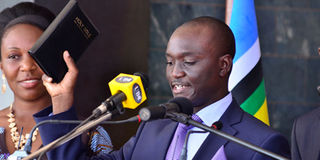Centenary struggling for a just society

Centenary (Right) swears in as Kasese Municipality MP during the swearing in ceremony at Parliament in Kampala last year. PHOTO BY ALEX ESAGALA
What you need to know:
- Away from politics, Robert Centenary, the Kasese Municipality MP opens up on his humble beginnings, family life and the uniqueness of his name.
His name fascinates many and he has become a constant in much of Uganda’s media space.
He is a resource in articulating matters regarding Kasese and the attack on the Rwenzururu palace where 116 people were killed and King Charles Wesley Mumbere captured.
Robert Centenary, the Kasese Municipality MP speaks with such poise occasionally rolling his eyes to empasise a point.
His words are a careful ensemble that instantly tell you of a grieved man with a lot of disdain for the injustices that he claims are being meted on the people of Kasese, the political Opposition and some Ugandans as a whole.
In the February General Elections last year, Centenary was elected Kasese Municipality MP after defeating NRM’s Ferigo Kambale with a margin of 723 votes.
His election was part of the wider movement that swept through Kasese handing majority of the district’s leadership to FDC.
But besides politics, Centenary, a staunch was born in 1979 to Franco Kule and Evanice Muhindo in current Kasese District.
Background
He was named Centenary, a commemorative name that was derived from the centenary celebrations to mark 100 years of the Catholic Church in Uganda.
At four years Centenary’s father passed away, introducing him to a difficult childhood that was a key motivation to the person that he has become.
“I would go to school barefoot but this could have been a key motivation for hard work,” he says, narrating how his mother had to sell used clothes, foodstuff and general merchandise to support them.
“There are many life lessons I learnt from my mother, a courageous and determined woman. She taught me that if I ever want anything in life, I have to work for it. She also taught me honesty, patience and open mindedness,” he adds.
Centenary attended Kasese Primary School before moving Rwenzori High School for his O-Levels.
In 1998, he completed his secondary education from Saad Secondary School in Kasese before joining Makerere University to study a Bachelor’s course in Social Sciences and graduated in 2002. He also holds an administrative law certificate that he obtained from the Law Development Centre in 2005.
After graduating, Centenary joined Hofokam, a microfinance institution where he worked until 2004. He moved to Ecumenical Church Loan Fund where he worked up to 2005 before moving to Care International where he worked up to 2008 as economic rights advisor.
He also briefly worked in Tanzania, Arusha in the tourism industry before returning to establish his own tour firm that he managed until he moved into politics.
In politics, according to Centenary, it has so far been a rough ride as the political elite, especially those in the ruling government view people in the Opposition as saboteurs and self-seekers.
“Our legislation has been reduced to just protecting the interests of the regime. There is no way we can transform our society if all we do is to stay silent on the injustices and the dysfunctional systems in our midst,” he says.
His love for politics dates back to his high school days where he was actively involved in youth activism.
Marriage
In 2010 Centenary married Doreen Mbabazi, who as he say has been supportive of his political ambitions that among others include moulding the desire to stand for the presidency in the next 15 years.
The couple has been married for seven years but are yet to be blessed with a child.
This has been used against him by some members of society, especially during last year’s elections but Centenary says he cannot to be derailed by such.
“My opponent even used it against me during campaigns. He paraded his children and told voters that I cannot be a good leader because I have no children,” he says, adding: “Children are a gift from God. They will come at the right time,” he adds.
A day in a life of Centenary
I am usually up by 6am. Before I do anything I listen or watch morning television programmes. Apart from watching and listening I check my social media accounts to ensure that I respond to different issues raised.
After settling them I prepare for the day and during days when I have committee meetings, I make sure that I leave home early enough.
Away from Parliament, I do com¬munity development work where I am required to come up with proposals, concepts and reports to support different activities.
I am usually busy and I hardly ever sit in my office, My eating habits have also been affected because if I am not missing a meal then I will have delayed lunch.
In Parliament you can either choose to work or sleep but you will be paid. At least I am one of those that have chosen to work for the people.
The earliest time I have retired back home is 9pm but most of the time, I am out late and sometimes even beyond midnight.




